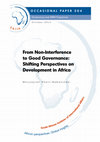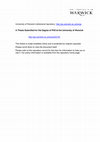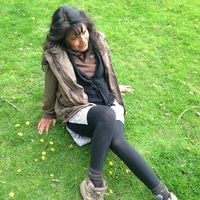Papers by Mouzayian Khalil

Philosophy and Theory in Higher Education, 4(2), pp. 51-86, 2022
The historical, cultural, political, and economic contexts of academic activism have been marked ... more The historical, cultural, political, and economic contexts of academic activism have been marked by the structural crises of capitalism, which, along with the emergence of neoliberalism, have sought to change the Academy and disciplines. The disciplinary impacts of neoliberal policies outside and within the academy have all influenced students, academics, and management in differing ways. Furthermore, academic activism in higher education requires a debate on the function of education, the role of the university along with disciplines, and exploration of the importance of ideology in relation to human emancipation or alienation. So too this debate should consider whether academia and activism occupy separate worlds in a discursive strategy the contradictions of the current system to work collaboratively and to be engaged as public intellectuals.
The way in which the African Peer Review Mechanism (APRM) has unfolded in Nigeria – a key regiona... more The way in which the African Peer Review Mechanism (APRM) has unfolded in Nigeria – a key regional player with Africa’s largest population – offers lessons and guidance to other participating APRM countries. The peer review process must be followed by the effective implementation of the National Programme of Action (NPoA) – the document that seeks to remedy any governance weaknesses unearthed in the review. The most significant challenges are poor monitoring and evaluation (M&E) of the NPoA’s implementation, limited capacity and funding constraints.

This paper 1 introduces the contextual linkages between the good governance agenda and Africa’s d... more This paper 1 introduces the contextual linkages between the good governance agenda and Africa’s development strategies, especially the newly defined role of civil society actors in Africa’s governance. The paper illustrates the institutionalisation of this ideal using the African Peer Review Mechanism (APRM). This suggests a shift away from the ‘non-interference’ approach of African leaders towards a more proactive approach to governance. Furthermore, while the role of civil society is emphasised for its potential to bring about the kind of participatory and collaborative governance and development processes desired in Africa, there is not yet sufficient empirical evidence that this brings about sustainable development. A B O U T T H E A U T H O R Dr Mouzayian Khalil-Babatunde is an independent researcher on the African Peer Review Mechanism and governance and development issues in Africa, with particular interest in regional and sub-regional institutions. She is also a lecturer at ...
Globalisation, Societies and Education
Calls continue for the decolonisation of higher education (HE). Based on internationalisation deb... more Calls continue for the decolonisation of higher education (HE). Based on internationalisation debates, a research team from Africa, Europe and Latin America reviewed published decolonisation voices. Using bibliometric analysis and a conceptual review of abstracts, the authors examined the drivers framing decolonisation in HE and identified the voices in those debates which involved the historically oppressed and those wishing to elicit change in these debates. The paper recognises the importance for decolonisation in education as the tensions explored by the authors often intersect through HE into other domains of the political, social, economic and culturally important areas for replication and change in society.
Globalisation, Societies and Education, 2021
Calls continue for the decolonisation of higher education (HE). Based on internationalisation deb... more Calls continue for the decolonisation of higher education (HE). Based on internationalisation debates, a research team from Africa, Europe and Latin America reviewed published decolonisation voices. Using bibliometric analysis and a conceptual review of abstracts, the authors examined the drivers framing decolonisation in HE and identified the voices in those debates which involved the historically oppressed and those wishing to elicit change in these debates. The paper recognises the importance for decolonisation in education as the tensions explored by the authors often intersect through HE into other domains of the political, social, economic and culturally important areas for replication and change in society.
South African Institute of International Affairs, Jan 23, 2015
This paper introduces the contextual linkages between the good governance agenda and Africa’s dev... more This paper introduces the contextual linkages between the good governance agenda and Africa’s development strategies, especially the newly defined role of civil society actors in Africa’s governance. The paper illustrates the institutionalisation of this ideal using the African Peer Review Mechanism (APRM). This suggests a shift away from the ‘non-interference’ approach of African leaders towards a more proactive approach to governance. Furthermore, while the role of civil society is emphasised for its potential to bring about the kind of participatory and collaborative governance and development processes desired in Africa, there is not yet sufficient empirical evidence that this brings about sustainable development.
South African Institute of International Affairs, Jan 13, 2015
The way in which the African Peer Review Mechanism (APRM) has unfolded in Nigeria – a key regiona... more The way in which the African Peer Review Mechanism (APRM) has unfolded in Nigeria – a key regional player with Africa’s largest population – offers lessons and guidance to other participating APRM countries. The peer review process must be followed by the effective implementation of the National Programme of Action (NPoA) – the document that seeks to remedy any governance weaknesses unearthed in the review. The most significant challenges are poor monitoring and evaluation (M&E) of the NPoA’s implementation, limited capacity and funding constraints.

This thesis assesses the African Peer Review Mechanism (APRM) as it has played out in Nigeria. Th... more This thesis assesses the African Peer Review Mechanism (APRM) as it has played out in Nigeria. The APRM is an initiative by the African Union (AU) and the New Partnership for Africa's Development (NEPAD) to promote good governance through self-assessment and monitoring by African states. The APRM is particularly interesting as a continental (rather than single country) programme which puts the good governance agenda in the hands of African states themselves (rather than international financial institutions, for example). Focusing on the National Programme of Action (NPoA) of 2009 - 2012, the research finds that the APRM has had little or no impact on governance in Nigeria. Notwithstanding the NPoA's limited contributions to national development, the entire process has failed to recognise, engage and tackle the underlying socio-political dynamics of politics in the country, which have the most impact on governance structures and processes. The thesis accounts for this outcome by examining structure (through the role of actors) and underlying socio-political dynamics, both nationally and internationally. In terms of actors the research explores the role of individual leaders, NEPAD and APRM secretariats (national and continental), federal state representatives, regional and sub-regional organisations, international donors, and civil society in the APRM process. In terms of underlying factors, Richard Joseph's theory of prebendalism gives analytical power to understanding the APRM within Nigeria's political culture, while the neo-Gramscian perspective of cultural hegemony enables an analysis of the APRM within the broader international context. Both contribute to a holistic assessment of the APRM in Nigeria. Neither one of these two theoretical contributions is able to offer a comprehensive assessment if used unmodified or on their own. The APRM has the potential to open new political spaces for collaborative engagement between government and civil society in Nigeria, with the possibility of beneficial effects for governance and accountability. So far, however, this potential has not been realised. This must be judged as a significant shortcoming to date.
Current research by Mouzayian Khalil
Conference Presentations by Mouzayian Khalil

The number of citizens engaged in for-profit and not-for-profit social enterprises in African cou... more The number of citizens engaged in for-profit and not-for-profit social enterprises in African countries is on the rise and data is limited in tracking this increase, or the reasons for the rise. 5 out of the 17 UN Sustainable Development Goals (SDGs) relate to sanitation and environmental sustainability directly, another 7 cover interrelated issues and targets. In developing countries ravaged by poverty and its related vices, issues of environmental sustainability appear secondary and fail to get the attention of governments. Yet, poor sanitary conditions, environmental degradation and unregulated industrial activities affect the most vulnerable through the spread of diseases and environmental pollution. This research examines social enterprises engaged in environmental sustainability action in Nigeria, to determine the nature and impact of their activities, how they are funded and what challenges they encounter in this sector. The results of this paper is based on interviews with the founders and team members of four eco-advocacy enterprises in Nigeria: Chanjadatti, Ecobarter, and Sustainability Vibes; Pick That Trash, an entirely web based advocacy community was also considered alongside. This inclusion highlights and evidences the dynamism and innovative nature of the groups working in this sector. This research analyses the emerging role and impact of social enterprises as ‘everyday’ agents in the international political economy of developing countries. The implications being that these social enterprises step into a significant yet widening gap between governments, donor agencies and the people, to meet the goals of environmental sustainability in their communities and countries.











Uploads
Papers by Mouzayian Khalil
Current research by Mouzayian Khalil
Conference Presentations by Mouzayian Khalil